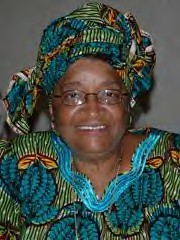
Ellen Johnson-Sirleaf, President of the Republic of Liberia. The west African nation has been a focal point in the international traffic of illegal diamonds., a photo by Pan-African News Wire Photo File on Flickr.
Liberians to test democracy in elections
Fran Blandy
October 11, 2011 - 12:54PM
AFP
Liberians go to the polls on Tuesday in the country's second election since it emerged from a 14-year civil war in 2003, which is being closely watched as a litmus test of its fragile democracy.
Nobel Peace Prize winner, President Ellen Johnson Sirleaf is facing a stiff challenge from main opposition candidate Winston Tubman, 70, who has crowd-pleasing soccer star George Weah as his running mate.
Some 1.8 million people have registered to vote in presidential, legislative and senatorial elections in which candidates will have to sweep an absolute majority to avoid an eventual run-off on November 8.
A total of 15 senatorial seats and 73 legislative seats are up for grabs.
Election Commission chief James Fromayan has said polls would open at 8am (1900 AEDT) and close at 6pm (0500 AEDT Wednesday). Counting would begin immediately with initial results expected late Tuesday night.
Final results will be announced on October 26.
Much is at stake in the elections as Liberia seeks to shake off its anguished past and become self-sufficient enough to no longer need the support of an 8000 strong UN peacekeeping mission (UNMIL).
UNMIL police, the Liberian National Police and regional security forces have fanned out across the west African nation to secure the voting process.
The long porous border with Ivory Coast is a particular cause for concern after armed mercenaries returning from fighting in that country's war flooded into Liberia.
The National Elections Commission is running the vote for the first time, as the 2005 elections were carried out by the United Nations, and 807 international and 4383 local observers are in place to monitor the vote.
James Victor Gbeho, president of the Economic Community of West African States (ECOWAS) commission, said on Monday the polls were "a real test of the process of further deepening democratic governance and national reconciliation after the protracted civil war and the return to civil rule in Liberia."
Sirleaf, whose campaign has been boosted by her Nobel Peace Prize announced on Friday, is credited for rebuilding the economy and ushering in massive investments, in areas such as iron ore, palm oil and oil exploration.
However the 72-year-old, who made history when she became Africa's first president in 2005, faces criticism at home, where extreme poverty persists amid an 80 per cent unemployment rate.
Her detractors say she has failed to bring about reconciliation in a nation with a dizzying array of ethnic rivalries which still turn deadly from time to time.
She has also failed to implement recommendations by a Truth and Reconciliation Commission which name her on a list of people who should be barred from public office for backing warlord-turned-president Charles Taylor.
Sirleaf initially promised to serve only one term, but has since said she did not realise the extent of the work required, and needs more time to rebuild the "broken country".
Liberia is Africa's oldest independent state, and was founded in 1847 by freed American slaves, who formed a minority Americo-Liberian elite which dominated politics and restricted rights of the indigenous people.
No comments:
Post a Comment